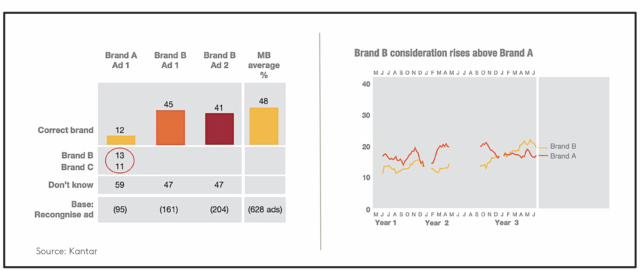The results here come from a 2016 Kantar Knowledge Point report about five situations in which Kantar data show bad advertising can help competing brands. In other words, spending your ad dollars on behalf of the competition, not yourself....
The results here come from a 2016 Kantar Knowledge Point report about five situations in which Kantar data show bad advertising can help competing brands. In other words, spending your ad dollars on behalf of the competition, not yourself.
The five situations:
Similar brands. (When your doppelgänger gets all the credit.) Similar branding devices. (Imitation is sincere flattery but bad branding). Parent/sub-brand confusion. (Too much family resemblance.) Misattribution to market leader. (The big wheel gets all the grease.) Misattribution to everyone. (Shining a light on everybody.)To put it another way, these are situations in which a brand fails to create enough difference. Difference builds brand value, but difference is a matter of communication, not product. It is what people believe about a brand—so advertising is critical to difference.
A Multi-Faceted Problem. Bad advertising hurts a brand in many ways. These charts are drawn from Kantar client work on behalf of Brand A, a mobile phone brand. In this category in the markets of interest at this point in time, many brands overlapped in terms of imagery and benefits. Brands A and B, especially. As part of diagnosing what was going on with Brand A, Kantar assessed its advertising. On the left, it’s clear that the ad was bad in multiple ways. To begin with, it failed to break through the attention span of 59 percent of consumers. Then, among those reporting some sort of recognition, just as many attributed it to other brands. Contrast that with the advertising of Brand B, which was working at roughly the level to be expected. However, Brand B had been off-air for a long time, yet, as seen on the right, its reported awareness went up. Courtesy of Brand A’s bad advertising.

Motivating, Too. What’s examined in the Kantar report from which these results are drawn is memorability, or the power of advertising to bring attention and recognition to a brand. That’s important, but not nearly enough. If the difference communicated—and recognized and properly attributed—is not motivating, then all is for naught. Difference alone is never enough. It’s never a matter of mere difference, even though many discussions of difference talk about it in isolation. It must be a difference that is motivating and meaningful. It must give people a compelling reason to buy. It must solve a need in a unique way. Difference could be trivial. Which is the unexamined part of the results shown here. Brand A’s advertising could be bad because the difference it is communicating is so frivolous that it is forgettable, thus randomly remembered, if at all. Difference must be motivating, too.
Difference In The Doing. High-level plans have to be right, but in the end it all comes down to execution. A lot of emphasis is placed on strategy in marketing. It’s the main focus of most marketing textbooks. It’s the big ideas we like to get on panels to discuss at conferences. It’s the way tales are told and reputations are made in business media. But strategy succeeds or fails on execution. This applies to building difference as well. In whatever way brands are designed and built, if difference is lost in the advertising or other communications, then the strategy fails.
Not because the strategy was bad, but because the strategy was badly executed. This is one reason why there is so much heat in the debate about difference vs. distinctiveness these days. The latter is little strategy and all execution. But there’s a confusion. Just doing things matters, but doing things that push strategic difference will always matter more.
Contributed to Branding Strategy Insider By: Walker Smith, Chief Knowledge Officer, Brand & Marketing at Kantar
The Blake Project Can Help You Craft A Brand Advantage In The Strategic Brand Storytelling Workshop
Branding Strategy Insider is a service of The Blake Project: A strategic brand consultancy specializing in Brand Research, Brand Strategy, Brand Growth and Brand Education
FREE Publications And Resources For Marketers














